How jurors helped uncover plot to fix drugs trial
- Published
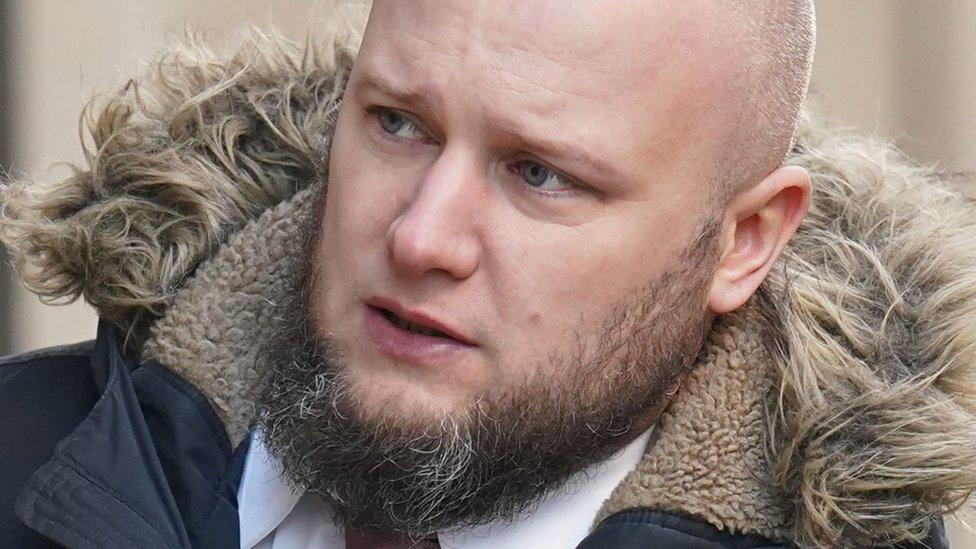
Damien Drackley tried to influence the trial of a drugs baron while sitting as a juror on the case
Four people have been found guilty of a "concerted attempt" to fix the trial of a drugs baron by tampering with a jury.
The defendant Leslie Allen, as well as a juror, the juror's mother, two witnesses and a go-between all plotted to pervert the course of justice in a drugs trial in 2018 at Warwick Crown Court, the Old Bailey heard.
One of these though died before the Old Bailey trial began and the juror's mother admitted her part in the plot and so did not face trial.
Juror Damien Drackley had boasted of how he had been offered £5,000 to try to persuade fellow jurors into finding Leslie Allen not guilty of the drugs offences, the prosecution said.
While witness Laurence Hayden was spotted nodding and winking at Drackley when he arrived in court to give evidence for the defendant.
But the conspiracy was foiled after fellow jurors spotted Drackley's odd behaviour and he was discharged by the trial judge.
Prosecutor Tony Badenoch KC said; "This was an agreement to pervert the course of justice with various parties playing their individual roles and carrying out acts to bring it about.
"It was, in short, a fix."
The court heard how in November 2018 Allen, 66, from Coventry, described as a "major drugs wholesaler", stood trial at Warwick Crown Court.
Allen was charged over seizures of cannabis with a street value of about £50,000 from his home in Coventry, a kilo of cocaine with a street value of £100,000 from his Jaguar car and pepper spray found in his desk drawer.
Mr Badenoch said: "It was on the face of it, at least, an unexceptional trial alleging drugs possession with a weapon."
But it was "something very different. Not least, because the defendant Leslie Allen had a man on the jury - Damien Drackley."
The Old Bailey heard car assembly line operative Drackley, 37, from Nuneaton, Warwickshire, was one of 12 randomly selected members of the public picked to sit as a juror on Allen's trial, becoming "Juror number One".
Each juror was vetted to ensure they had no knowledge of the background details of people and places connected with the trial and were subject to strict rules about not discussing the case with friends or family.
However, from the first day of the drugs trial Drackley was in regular contact with his mother Lorraine Frisby, 55, from Birmingham, providing a "running commentary" on the case in calls he recorded on a telephone app.
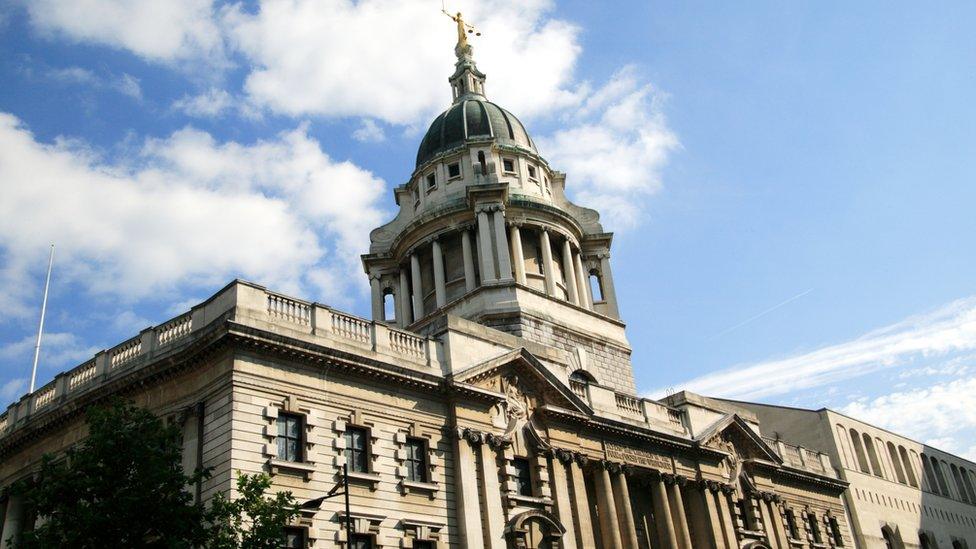
The Old Bailey heard Leslie Allen was ultimately found guilty at his 2018 trial of possessing cocaine and cannabis with a street value of £150,000
Giving evidence at his Old Bailey trial, Drackley tried to explain his actions by saying his mother was "bossy" and "some way or another she would have got it out of me".
Frisby had then made contact with an intermediary, co-defendant Mark Walker, 57, from Coventry, who in turn put her in direct contact with Allen, who was on bail.
The weekend before the drugs trial jury started deliberating its verdicts, Frisby rang her son to say: "I just had that Mr Allen on the phone... said he would sort you out... Mr Allen said it makes him feel a bit better knowing he's got a face on the jury."
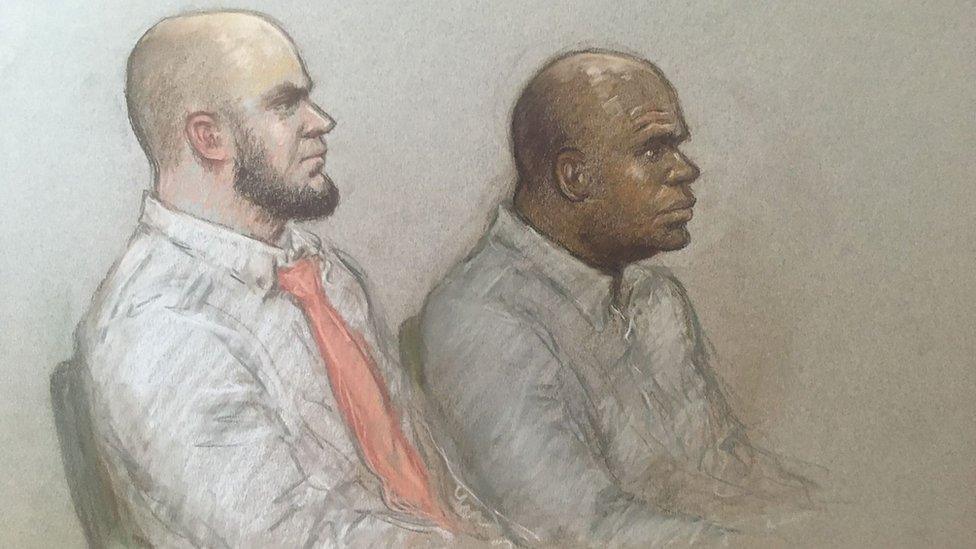
Damien Drackley (l) and Mark Walker (r) conspired to pervert the course of justice
Drackley then boasted to his girlfriend he and his mother knew the "geezer" on trial and "that if he wants to pay me I ain't gonna say no am I?"
Jurors called to give evidence at the Old Bailey trial described how Drackley was "aggressive" in arguing Allen should be acquitted and nothing was going to change his mind.
Juror Dominyk Maggs said it had been "odd" when he had seen defence witness Hayden, 53, from Coventry, known as "Del Boy", give a "very obvious" nod directly at Juror number One, while another juror said he had seen Hayden "wink" at Drackley.
But the plan by Drackley and others to sabotage the trial started to unravel when Drackley revealed he had background knowledge about locations involved in the drugs trial that he had not declared at the start of the case.
'Very stressed and worried'
The jury foreperson from the trial, Elizabeth Jones, said as a result, two of the jury had written letters to the judge about their concerns.
Describing her feelings at the time she said: "It was awful. It was awful. It was toxic. We were very stressed and worried. We didn't want to do the wrong thing. We wanted to do the right thing and didn't expect anything like this at all."
On the judge's directions, Drackley was immediately removed from the jury.
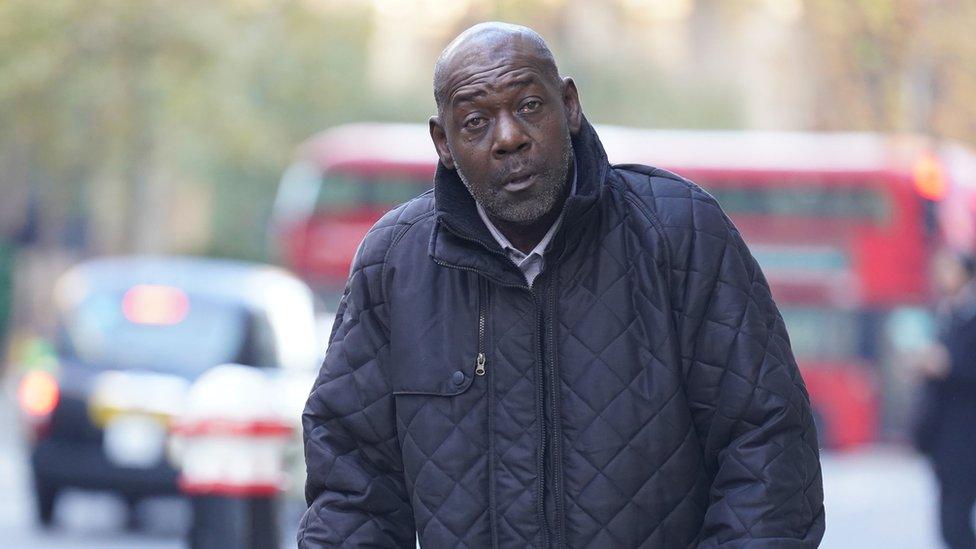
Mark Walker was a co-defendant at the drugs trial in Warwickshire in 2018 and part of the plot to rig the verdicts
His mobile phone was also seized, which revealed he had been discussing the case with his girlfriend and mother, who in turn was passing information to the defendant.
The trial judge decided the case should continue without a jury and, on 23 November 2018, Allen was convicted by him of the drugs and pepper spray offences and sentenced to 13 years in jail.
On 8 February 2021, Lorraine Frisby pleaded guilty to a charge of conspiracy to pervert the course of justice and an offence of soliciting the disclosure of jury deliberations.
Drackley also pleaded guilty to engaging in prohibited conduct as a juror and disclosing jury deliberations, but denied perverting the course of justice.
Neither defendants Leslie Allen, who refused to leave his prison cell, nor Laurence Hayden, who is on the run, attended their trial at the Old Bailey.
Hayden had been convicted on 16 September 2016 at Coventry Magistrates' Court of an offence of intimidating a witness.
Another defendant, Daniel Porter, who was also charged with perverting the course of justice after giving evidence for Leslie Allen, died before the trial at the Old Bailey, the court heard.

Follow BBC West Midlands on Facebook, external, Twitter, external and Instagram, external. Send your story ideas to: newsonline.westmidlands@bbc.co.uk, external
Related topics
- Published30 November 2022
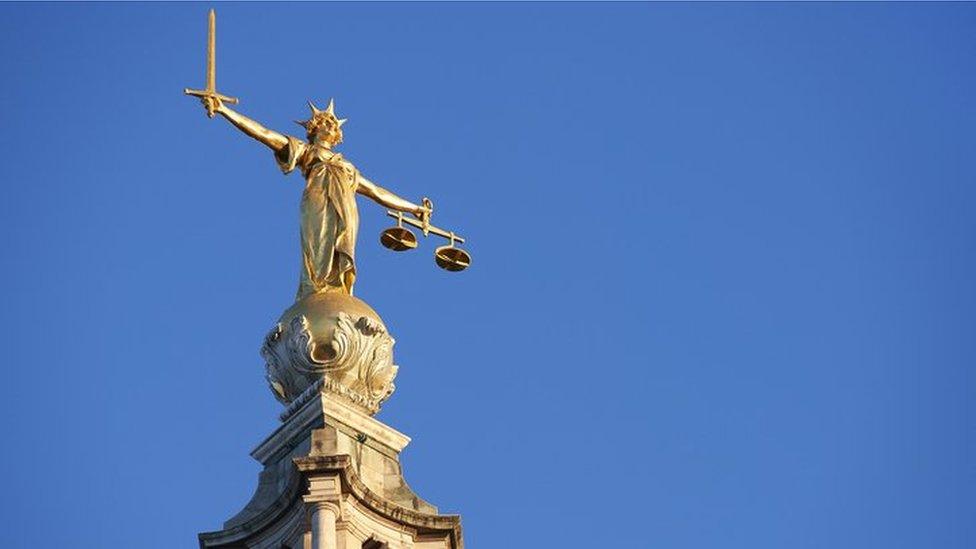
- Published28 November 2022

- Published14 November 2022

- Published9 November 2022
